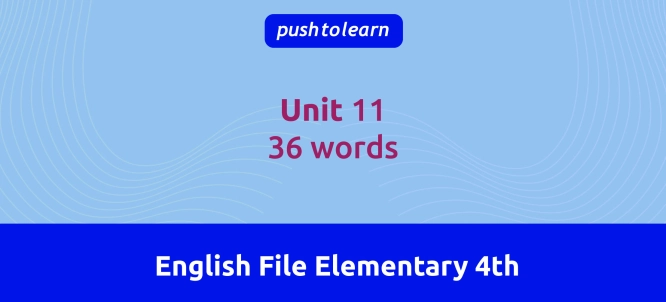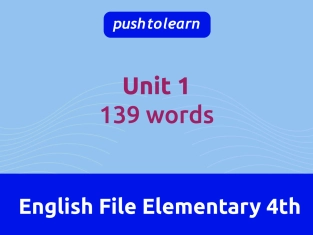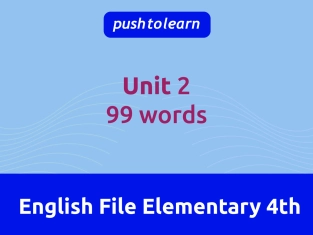by PushtoLearn
Unit 11
Table of Contents
Unit 11, English File Elementary 4th – Exercises and Flashcards
These exercises focus on Unit 11 of English File Elementary 4th
Vocabulary List for Unit 11
Adverbs
-
Calmly (adverb)
Definition: In a peaceful or relaxed way.
Example: "She spoke calmly during the interview." -
Dangerously (adverb)
Definition: In a way that is unsafe or risky.
Example: "He drove dangerously on the icy road." -
Fluently (adverb)
Definition: In a smooth and confident way, especially with language.
Example: "She speaks French fluently." -
Politely (adverb)
Definition: In a way that shows good manners.
Example: "He asked politely for directions." -
Well (adverb)
Definition: In a good or satisfactory way.
Example: "She sings very well."
Verbs for Intentions and Needs
-
Decide (verb)
Definition: To choose between options.
Example: "I need to decide where to go on holiday." -
Forget (verb)
Definition: To not remember something.
Example: "Don’t forget to take your keys." -
Learn (verb)
Definition: To gain knowledge or skills.
Example: "I want to learn how to play the guitar." -
Promise (verb)
Definition: To say you will do something.
Example: "I promise to help you with your homework." -
Try (verb)
Definition: To make an effort to do something.
Example: "I’ll try to finish my project today."
Technology and Online Activities
-
Attachment (noun)
Definition: A file sent with an email.
Example: "Please check the attachment for more details." -
Log in (verb phrase)
Definition: To access a computer system or website by entering your username and password.
Example: "I need to log in to check my emails." -
Search (verb)
Definition: To look for information online.
Example: "I searched for the nearest restaurant on my phone." -
Wi-Fi (noun)
Definition: A wireless internet connection.
Example: "Does this café have free Wi-Fi?"
Travel
-
Bus (noun)
Definition: A large vehicle used for public transportation.
Example: "I take the bus to work every morning." -
Plane (noun)
Definition: A vehicle that flies in the air to transport people or goods.
Example: "We’re traveling to Spain by plane." -
Tram (noun)
Definition: A vehicle that runs on tracks in a city.
Example: "The tram stops near the art gallery." -
Taxi (noun)
Definition: A car you pay to take you to a destination.
Example: "We took a taxi to the hotel."
Money and Work
-
Insurance (noun)
Definition: A policy that provides financial protection against loss or damage.
Example: "We bought travel insurance for our holiday." -
Salary (noun)
Definition: Money earned from working, paid regularly.
Example: "She gets her salary at the end of the month." -
Tip (noun)
Definition: Extra money given to someone for their service.
Example: "We left a tip for the waiter at the restaurant."

Wordlist for Unit 11, English File Elementary 4th
|
Word |
Example |
|
calmly |
Dad took the news very calmly |
|
dangerously |
My mum drives really dangerously |
|
fluently |
Can you speak English fluently? |
|
hard |
Agnieszka is a doctor. She's got a hard job |
|
loudly |
Don't speak on the phone so loudly! |
|
patiently |
He waited patiently for his turn |
|
politely |
'Did you sleep well?' she asked politely |
|
seriously |
"This is important", she told me seriously |
|
well |
Are you well? |
|
decide |
I can't decide what I want to do |
|
forget |
Don't forget about your hometask |
|
hope |
Can you still get tickets? "Not a hope!" |
|
learn |
Are you going to learn a new language next year? |
|
need |
I need some help |
|
plan |
Do you have any plans for the weekend? |
|
promise |
After his election promises his actual performance was an anticlimax |
|
remember |
Are you good at remembering people's names? |
|
try |
Can you try to finish your homework tonight, please? |
|
want |
Do you want a coffee or a cup of tea? |
|
attachment |
Can you send the article to me as an attachment, rather than in the body of the email? |
|
broadband |
A lot of houses have a broadband connection now |
|
log in |
Most of its fans log in from Brazil, India and the US |
|
read a book |
Let's read a book! |
|
search |
Do a search for cheap tickets |
|
social media |
I use social media to keep in touch with my friends from school |
|
take a photo |
Can you take a photo of me and Rachel? |
|
wi-fi |
Does this hotel have free Wi-Fi? I need to check my email |
|
bus |
Bus goes every 10 minutes |
|
coach |
A coach can help you become a better business leader |
|
plane |
Have you ever been on a plane? |
|
taxi |
A taxi driver wanted five dollars to drive me to my hotel |
|
train |
I was on a platform waiting for a train |
|
tram |
Do you go by tram? |
|
insurance |
His insurance covers the doctor's fee |
|
salary |
Employees get salary twice a month |
|
tip |
Can you give me some tips on how to cook spaghetti bolognese? |
FAQ
How can I use adverbs in sentences?
Adverbs usually describe how something is done. Place them after the verb or at the end of the sentence:
-
"She speaks English fluently."
-
"He works very hard."
What’s the difference between “try” and “promise”?
-
Try means to make an effort but without a guarantee of success. Example: "I’ll try to call you tomorrow."
-
Promise means to commit to doing something. Example: "I promise to call you tomorrow."
How do I talk about technology?
Use technology words in practical contexts:
-
"I forgot to attach the attachment to my email."

